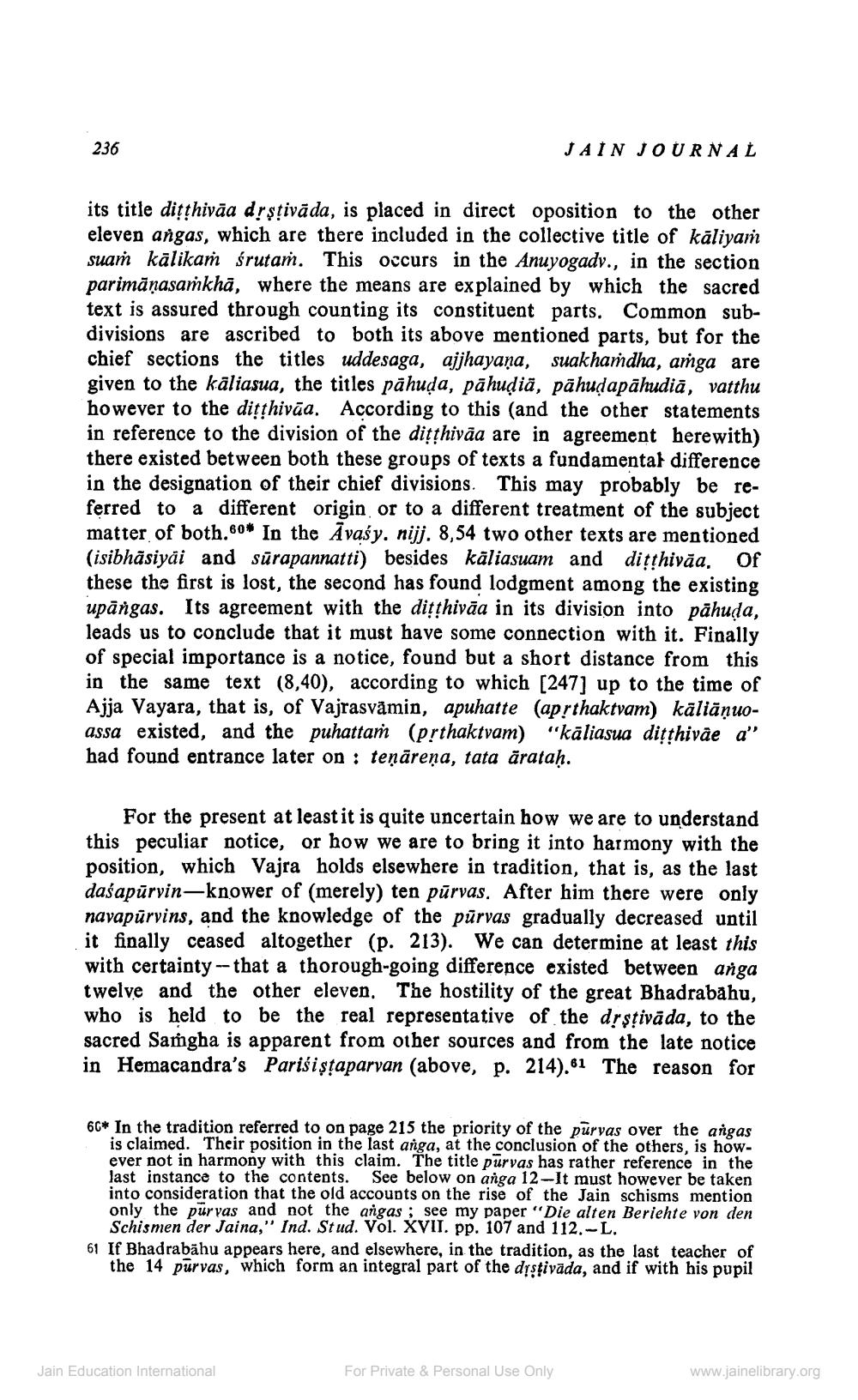________________
236
JAIN JOURNAL
its title ditthivāa drstivāda, is placed in direct oposition to the other eleven angas, which are there included in the collective title of kāliyam suam kālikaṁ Śrutam. This occurs in the Anuyogadv., in the section parimāṇasaṁkhā, where the means are explained by which the sacred text is assured through counting its constituent parts. Common subdivisions are ascribed to both its above mentioned parts, but for the chief sections the titles uddesaga, ajjhayana, suakhaṁdha, asga are given to the kāliasua, the titles pähuda, pāhudiā, pāhudapāhudiā, vatthu however to the ditthivāa. According to this (and the other statements in reference to the division of the ditthivaa are in agreement herewith) there existed between both these groups of texts a fundamental difference in the designation of their chief divisions. This may probably be referred to a different origin or to a different treatment of the subject matter of both.60* In the Āvasy, nijj. 8,54 two other texts are mentioned (isibhāsiyai and sūrapannatti) besides kāliasuam and ditthivaa. Of these the first is lost, the second has found lodgment among the existing upāngas. Its agreement with the ditthivāa in its division into pāhuda, leads us to conclude that it must have some connection with it. Finally of special importance is a notice, found but a short distance from this in the same text (8,40), according to which [247] up to the time of Ajja Vayara, that is, of Vajrasvämin, apuhatte (aprthaktvam) kāliāņuoassa existed, and the puhattaṁ (prthaktvam) "kāliasua ditthivãe a had found entrance later on : tenāreņa, tata äratah.
For the present at least it is quite uncertain how we are to understand this peculiar notice, or how we are to bring it into harmony with the position, which Vajra holds elsewhere in tradition, that is, as the last daśapūrvin-knower of (merely) ten pūrvas. After him there were only navapūrvins, and the knowledge of the pūrvas gradually decreased until it finally ceased altogether (p. 213). We can determine at least this with certainty--that a thorough-going difference existed between anga twelve and the other eleven. The hostility of the great Bhadrabahu, who is held to be the real representative of the drstivāda, to the sacred Samgha is apparent from other sources and from the late notice in Hemacandra's Parisistaparvan (above, p. 214).81 The reason for
66* In the tradition referred to on page 215 the priority of the purvas over the angas
is claimed. Their position in the last anga, at the conclusion of the others, is however not in harmony with this claim. The title purvas has rather reference in the last instance to the contents. See below on anga 12-It must however be taken into consideration that the old accounts on the rise of the Jain schisms mention only the pūrvas and not the angas ; see my paper "Die alten Beriehte von den
Schismen der Jaina," Ind. Stud. Vol. XVII. pp. 107 and 112.-L. 61 If Bhadrabāhu appears here, and elsewhere, in the tradition, as the last teacher of
the 14 purvas, which form an integral part of the distivada, and if with his pupil
Jain Education International
For Private & Personal Use Only
www.jainelibrary.org




